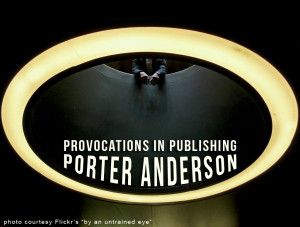‘Doctor Who’ and Those School Lockers
By Porter Anderson (@Porter_Anderson) | July 21, 2017 |

Image – iStockphoto: Surpass Pro
‘It’s Populism’
For several years, I was one of the local stars (God help the locals) of PBS pledge drives at a network affiliate in the southerly states of America. That was where I first encountered Doctor Who. More to the point, I encountered its fans.
On the Saturday night of my emcee duties, our phone banks were manned by the desperately devoted teens who watched the show with its awful MOOG-wheedling theme song (we played it a lot to trigger donations) and that infernal business about the flying police box you had to call a TARDIS or be laughed at for showing your Who-ignorant butt.
One of my duties as local star was to explain to our viewers that TARDIS stood for “Time and Relative Dimension in Space”–and to assure them that important concepts about the space-time continuum might be quite close to us as we yammered on about all this. The Beeb had been pumping this stuff into Her Majesty’s living rooms since 1963, you know, 30 years before the Maastricht Treaty. It’s a wonder Europe let them in, let alone out.
The Whovians taught me a lot about entertainment cults, although “cult” is too harsh a word for these kids. They were unfailingly sweet, thrilled, painfully awkward misfits. Most of them could drive a phone and take the pledges coming in, but that was about it. I’d catch glimpses on the monitor of myself in the studio, resplendent (shut up) in my tuxedo, interviewing ardent young citizens dressed in lots of cookware from their mothers’ kitchens.
In this era, stage fright still existed. It took nerve for our strange youths to face the lights and my microphone to tell us how much Who meant to them.
Many of these kids, you could tell, were cripplingly unpopular at school. Or simply invisible. And Who gave them a place in the universe. A place on a live PBS broadcast. We talked about their love for K9, the show’s endlessly annoying mechanical dog. More donations poured in from more misfits watching at home with cheese graters attached to their belts.
These were magnificent, brave young Time Lords and Companions, driven home after the show by the concerned parents of socially challenged children.
‘One Long Self-Indulgent Pantomime’

Provocations graphic by Liam Walsh
Earlier this month, the London-based game and television writer and producer Dave Morris was on his Mirabilis: The Year of Wonders blog site, quoting a recent monologue from the Doctor about “I do what I do because it’s right. Because it’s decent. And above all, it’s kind. It’s just that. Just kind.”
Morris rather courageously nailed the sanctimony into which the show has fallen, sound and fury signifying everything better left unspoken. “That, right there,” Morris writes, “is why I can’t sit through an episode of Doctor Who anymore. Because it’s become one long self-indulgent pantomime, all speeches to the audience about how special the character’s feelings are.”
And he wrote this on July 2, before the announcement this week of the first female Doctor Who stormed the tabloids. Actor Jodie Whittaker is to be paid no less than the latest male Doctor, Peter Capaldi, thankfully, a critical point in the UK, as in the US of A.
But will she be handed the same fulsome dialogue Capaldi was given?
Morris’ bigger point–mercifully going farther than the planet Gallifrey–is that “The sensibilities of YA fiction have taken over a lot of stories today. In effect, the characters are adolescents, with everything that happens in the story being about them personally…We’re going to hear a lot more speeches about how hard it is to be a hero, a lot more tear-jerking farewells as the music swells. Moments in which the show can run out in front of the fans and tell them its manifesto.”
There’s nothing wrong with good YA, actually. As long as it pushes past the lockers.
I read Morris’ column just as an otherwise well-produced series I’d discovered on Netflix had gotten to its first school-locker scene. So I was primed by more inexcusable suburban sentimental attachment to the damned lockers at high school. Do we really ever need to see another school locker scene? The changing of classes, the preening of the cute kids, the loneliness of the hated kids, the imperious stare of the teachers, and yes, the declamatory statements before the slam of the locker door: “Because I loved you!” or “Because I hated you!”
 “It’s populism,” Morris writes. “Bad enough that it’s wrecking politics, now it’s taken root in storytelling, too. Every season of Doctor Who is like a barrage of self-congratulatory Trump tweets.”
“It’s populism,” Morris writes. “Bad enough that it’s wrecking politics, now it’s taken root in storytelling, too. Every season of Doctor Who is like a barrage of self-congratulatory Trump tweets.”
And that’s where we’ve seen this trend before, seen this show before, read this book before, isn’t it? Our civic life is trapped in the TARDIS.
Today we’re six months into another self-indulgent pantomime, referred to by a euphemism, no matter how you see it: “the administration.” And that show’s dialogue is full of self-aggrandizing, declarations of making something great again and what’s “very unfair to the president” (never mind the country) and family, family, family, lockers slamming in the halls of the West Wing.
I get what Morris is saying. How much of what you’re reading today ends up at the lockers? And is that what you’re writing? “The fans just lap this stuff up, of course,” Morris writes. So do certain voters. “The more a show refers to itself, the more they love it.”
And you need to sell your books, of course, I get that. You need fans to lap them up. So I’m worried about you. As I was worried about the young Whovians. As I’m worried about the country. Can I lend you my cheese grater?
Are you writing school locker scenes? May I offer you a small sum of cash to resist? Have “the sensibilities of YA fiction taken over” your stories? Are you conscious of the populism sweeping our fiction today just as it’s steamrolling our political nonfiction? Does this add a challenge to your work?
[coffee title=”Wish you could buy Porter a glass of Campari?” icon=”glass”]Now, thanks to tinyCoffee and PayPal, you can![/coffee]









Oh, man, can I tell you just how much I disagree with you about Doctor Who? I have been a fan of the show since the 1970s. Was I one of those painfully earnest young people? Probably. In some ways, I’m still that person. I turn 54 this year, and yet I still gravitate toward the show and its platitudes. Why? Because as the world gets more and more complicated, I want a place where it’s okay to be earnest and sentimental.
And remember, Doctor Who was (is) a children’s show. We have plenty of cynical, grim-dark entertainment out there. I even read/watch/enjoy some of it.
And I absolutely don’t follow you in linking the themes and messages of Doctor Who with the blatant spin and overt lies of our political administration. There is a universe of difference between tongue in cheek self referential fiction and deliberate manipulation.
Oh, and you don’t have to worry about me. I grew up to be just fine, even though the cheesy earnestness of Doctor Who was an early influence in my life.
p.s. While I have a lot of critique of the show, it runs along very different lines than yours.
Cool. Have a nice day.
-p.
On Twitter: @Porter_Anderson
My first attempt at a comment was eaten by the crack in the wall/at the end of the universe or sent back to 1929 by the Weeping Angels, so here we go again:
We stopped watching early in the Capaldi run, just sort of drifted away, but also driven away by the “Impossible Girl” who became just a bit too much for us (Love the actress, really didn’t like the character or how they used her), so I can’t comment from the experience of watching. However, the passage cited in Morris’ blog reminds me not so much of populism and politics as the way M*A*S*H went from being a really funny show with a serious undertone to a vehicle for Alan Alda to stand on his soapbox each week. It will be interesting to see if the combination of a new (Lady!) Doctor and a new showrunner can reinvigorate the series.
Agreed, Jeffo, re: the show.
And sorry about the original comment being eaten. The entire site was crashed for more than 24 hours. Goddamn Weeping Angels.
Cheers,
-p.
On Twitter: @Porter_Anderson
I cheered when the Doctor made his kindness speech. It was obviously in reaction to the violence Britain was facing at the time (and continues to). Good for the writers for stepping up and sending out a positive message.
Good, J.
-p.
On Twitter: @Porter_Anderson
Love the cheese graters. I’ve been known to spray a pair of boots silver and be very proud of myself. I was definitely a quiet nerdish fan.
I’d like to explain why I liked Who in the early 70s. It was the first time I’d seen the everyday made unusual; it took ideas I might encounter in school physics or history lessons and bent them into startling stories of mystery and menace. It was an invitation to be bold with imagination – a terrific start for a writer. Now it doesn’t, it just hopes to get you tweeting its lines. It’s become cheap and sickly. I’m sad about that and I can’t disagree with you.
Oh, and I can’t disagree with Dave. Which is fortunate. Signed, Mrs Dave.
Dear Mrs. Dave,
Yes, exactly. The sadness is a key to this for many big-kid Whovians, I think.
And the idea of taking the everyday and making it normal was particularly potent in its early going because it was doing this for American viewers (for whom a police box was anything but normal, and so were the dialects). Yanks resonated especially well to cheese graters because we have those, too.
I think your comment about the tweetable lines is significant to what’s happened to much of commercial entertainment. So many shows are set up precisely to elicit that kind of “audience engagement” (which to the networks means demonstrable marketing evidence for advertisers, sponsors, and underwriters). There’s a cynicism to all this pandering to the tweeterie, which is nasty, artless, and devoid of literary impulse or value. Many properties have followed this sorry pathway, of course. There’s a cable network here called Bravo, once a place of classical performances, now nothing but cheap schlock entertainment. Another is called Arts & Entertainment (now just A&E, as if ashamed to even say the word “arts,” which the network has long abandoned). There was a day when Arts & Entertainment’s magazine assigned me interviews with Jeremy Irons and other serious contenders as new shows featuring them came out. Now, decades later, the network is unwatchable.
In the long run, and Doctor Who has certainly had one, the cycle seems inevitable in our culture. We take what began as art and beat it into commercial sawdust. The scale on which our entertainments must operate in order to “succeed” is so big that only lowest-common-denominator appeal is adequate. The currency of the day is self-impressed characters who, as Mr. Roz tells us, hold forth on the goodness of their intentions and the nobility of principles that comfort the peasants and cheer the trailer parks. And this, yes, is Trumpian.
Ultimately, the everyday is just everyday. Our presidents are just rude realtors. And our writers just put out more everyday hokum. That’s why our book markets are glutted. And not with good books but with the everyday.
Finally, it’s just a police box, after all. And graters belong in the kitchen.
Awful long way from Gallifrey, aren’t we?
-p.
On Twitter: @Porter_Anderson
Porter-
I wonder if the upset of some longtime Dr. Who fans over the recent casting change mirrors something in our American politics.
People are afraid of changes to their safe place. It may be a precarious place, actually, but is still our place. Fandom. Where you can fit in. It’s sacred. Especially after so many years.
So it is with America. A hurting place, but still our place. Don’t change it.
Thing is, change is life. For writers, change is the essence of story yet writers resist it. They resist changing familiar genre patterns. They resist editing, sometimes.
It we’ve learned anything from TARDIS, though, it’s that if you want to fly a police box across the universe, you’ve got to bend space-time. Dr. Who gets in the box, but writers do best when they break out of the box.
To get anywhere, you’ve got to be a little unsafe.
So very well said, Don, thanks for this.
As I was saying to “Mrs. Dave” (Roz Morris), so many writers seem to be hunkering along with the political bilge of the day, to make…something great again. As you say, it means to make something safe again. To make it stop changing. To revert to…what was it? We can’t remember, you know, and yet, my God, we long for what we think it must have been like. World without change. Amen.
My favorite line from the late Harold Pinter is from his “Old Times.” Anna says it: “Sometimes I remember things that never really happened.”
Yet our writers, as you say, resist it. You’ve put this so well. “Change is the essence of story.” How CAN that be so hard to grasp, to remember, to face, and to capitalize upon?
Your comment makes me sorry we haven’t had dinner in such a long time, we’re overdue and I look forward to the next chance.
Thanks for this. Here’s to being a little unsafe.
-p.
On Twitter: @Porter_Anderson
If we don’t change we don’t learn.
Now if only the daily news would stop making me want to weep.